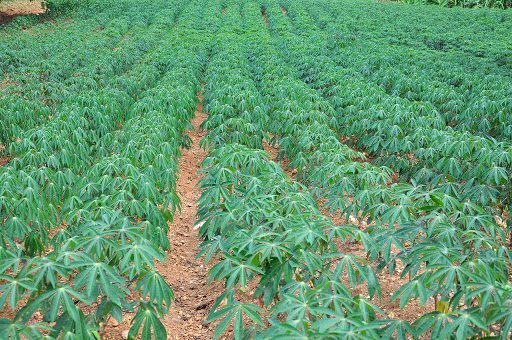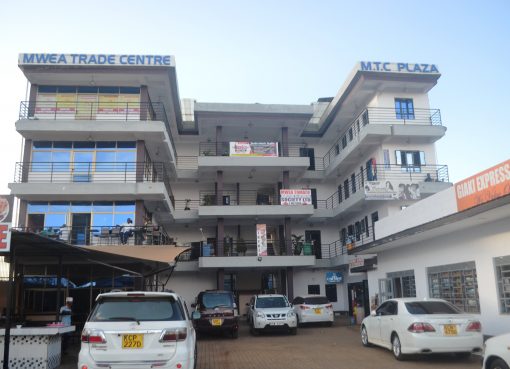Researchers at Egerton University are banking on new cassava varieties to encourage alternative farming of the food crop in Nakuru, in the wake of reduced maize yields in the county.
The initiative dubbed, ‘The cassava value chain Community Action Research Project (CARP),’ funded by the Master Card Foundation through the Regional Universities Forum for Capacity Building in Agriculture (RUFORUM), is also seeking to boost value addition for cassava, which is largely consumed as subsistence food in Kenya’s rural households.
Lead scientist, Prof. Richard Mwanza Mulwa said rural communities in drier, resource poor and food insecure areas of Lare, Lower Subukia and Solai were being targeted to adopt the improved varieties, which have a potential to yield 30 tonnes of cassava per hectare, three times what a farmer gets from traditional types.
The initiative targets to create jobs, increase food and nutrition security, as well as improve cassava quality, productivity and its marketability both locally and abroad.
Prof. Mulwa, who is also Director, Institute of Crop Management Research Training at the University observed that though mostly grown for subsistence and with limited commercialization, cassava was a drought tolerant food security crop that can withstand erratic rainfall pattern caused by climate change.
Kenya has 200,000 hectares (494,210 acres) under cassava. About 60 per cent of the crop is in Western, Coast area including Kwale, Lamu, Kilifi and Tana River, accounting for 30 per cent, while the rest is in parts of Rift Valley and Central.
Prof. Mulwa said the programme seeks to increase average production for subsistence farmers from 2.5 metric tonnes per acre to 7 metric tonnes, and for pre-commercial farmers from 5 metric tonnes to 10 metric tonnes per acre.
Cassava has a high production per hectare and does well in drought conditions. It can also help the country ease pressure on maize.
He said that uptake of cassava farming in Nakuru was being hampered by fear of the crop because of its toxic nature as incidents of food poisoning have been reported from consuming raw cassava, with traditional varieties known to have cyanide.
Another major setback to adoption of the food crop in Nakuru is the long maturity period of traditional varieties, which in some cases takes more than eighteen months to mature, compared to fast maturing crops like potatoes that take three to four months.
The project is working on the less toxic, disease tolerant and early maturing sweet cassava planting materials for increased production.
“Sweet cassava is generally made safe to eat by peeling and thorough boiling. However, bitter cassava varieties require more extensive processing to make it safe for consumption, there has to be prolonged soaking of the roots in water to allow leaching and fermentation to take place, followed by thorough cooking to release volatile hydrogen cyanide gas and reduced toxicity.
We are currently incorporating 6,000 small holder farmers in Njoro, Lower Subukia and Solai Sub Counties of Nakuru. It is envisioned that the initiative will eventually spur growth of cottage industries in areas where the food crop is cultivated across the country,” stated Prof. Mulwa.
The University is working jointly with the County government of Nakuru, Mtakatifu Clara Community Based Organization and East African Breweries in breeding varieties that are resistant to cassava mosaic disease and cassava brown streak disease that will be distributed to women and youth groups. The conventional cassava takes 10 years to breed, but the scientist hopes the new variety will take half the time.
“We have developed 29 cassava varieties out of which 7 varieties mature within six months. Egerton University’s Food Science Department has been mainstreamed to work with farmers particularly women and youth groups in value addition. The department is working on animal feed formula that incorporates, Acacia pods, the noxious mathenge (Prosopis Juliflora) weed with cassava as a base. This skill will later be transferred to farmers,” he explained.
The University has also established nine cassava varieties sites in the three Sub Counties of Njoro, Lower Subukia and Solai.
Prof. Mulwa said communities in the targeted areas were set to benefit from the value addition chain training since the project will engage in market oriented agriculture, where cassava growers will be linked to industrial manufacturers.
“Cassava has a huge unexploited potential as raw material for a wide array of value-added products, from coarse flour to high-tech starch gels. Modified cassava starch can be used in the manufacture of alcohol, animal feeds and baked products. In advanced technologies the crop in an important base in the manufacture of plywood, paper and textiles.
These are some of the industry players that we will be linking our cassava farmers with. We are also very keen on the quality of cassava raw material churned out by growers” stated Prof. Mulwa.
It is expected that once the initiative is rolled out countrywide over 100,000 people, 60 per cent of them women, will acquire clean and quality planting materials and will be assisted to improve productivity and marketability of the food crop as a raw material for industrial needs.
He said cassava is critical in terms of food security and is also in high demand among beer makers, because of its starch ingredient, while value addition will ensure farmers put food on the table and make money by selling the products.
“East Africa Breweries Limited (EABL) is one of our major industrial partners in the project. We are jointly working with EABL on possibilities of brewing high quality beer from cassava. Kenyans should embrace cassava production because in addition to being consumed as food, the same is also a much sought after raw material for production of many other industrial products” expounded Prof. Mulwa.
In the wake of ban on plastic bags, the project is rooting for production of biodegradable packaging materials from cassava. Prof. Mulwa says ongoing research has established that cassava can be transformed into a biodegradable green paper which is not only environment-friendly but also enables food to be stored for a long time.
“Use of cassava to produce biodegradable paper bags will not only ensure environmental protection but also steer agriculture from low-productivity enterprises to high-productivity commercial production. We are in the process of engaging key industrial players towards achieving this objective.
The technology is being deployed in Indonesia where sustainable packaging materials are made from cassava. These packaging materials are 100 per cent natural, biodegradable, sustainable, compostable and recyclable” stated the don who also lectures at the University’s Department of Crops, Horticulture and Soils.
We are working overdrive to ensure that the tuber is adapted by farmers from regions across the country which have majorly been concentrating on maize and wheat farming for a living so as to promote mixed farming. These areas have experienced acute attack of army worms too which leads to low yields during harvest season.
Cassava’s higher tolerance threshold to a variety of stresses such as water and heat, water salinity and emergence of new pests holds the key in addressing sustainable food and nutrition security.
It will strengthen resilience to climate change, create employment opportunities and increase incomes for small holder farmers” said the lead researcher.
Through value addition, farmers produce cakes, crisps, fries, gari (breakfast cereal) and flour for making chapati, among other products under the programme dubbed ‘Commercial Village’.
In the model, farmers grow the crop individually but process and sell the products as a group. They also operate joint savings and micro-lending.
By Anne Mwale





